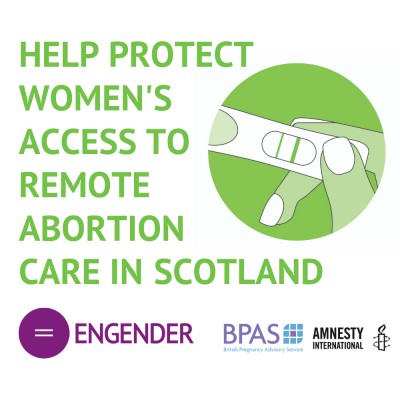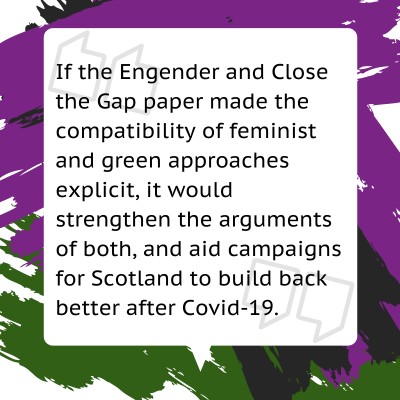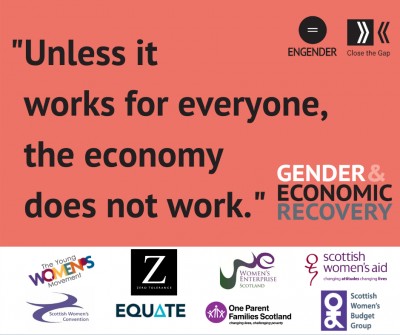Engender blog
Our Bodies Our Rights in Lockdown
In this blog, Engender's Policy and Parliamentary Manager Eilidh Dickson, discusses the Our Bodies Our Rights report, the impact of the Covid-19 pandemic on disabled women, and our new survey developed with People First Scotland.
-400.png)
This month represents an anniversary nobody could have previously imagined as we mark a year since the first Covid-19 cases in Scotland and the transition into the first national lockdown on the 23rd March 2020. Even in those early weeks, Engender highlighted how Covid-19 and the public health measures necessary to save lives would impact on women, from access to decision-making to mental health of unpaid carers and frontline workers in health and social care and to increased childcare and home-schooling making it even harder for women to combine paid and reproductive work.
Women have shared their diverse but often deeply distressing stories with us through our Women Covid Scot page, all too often describing the risks of working on the frontlines; fear of careers disrupted or derailed and the toll of balancing paid work, mounting domestic work and home-schooling with limited support from employers or partners, cut off from their external support networks. UN Women has estimated that the pandemic could set back global progress on women’s rights back by 25 years.
In March 2020 Engender was also preparing to host an event at the Scottish Parliament reflecting on a year since the launch of our Our Bodies Our Rights Report which examined the barriers to disabled women's reproductive rights in Scotland. This project saw us speak with disabled women across Scotland to hear about their experiences of puberty, sex education, relationships, family planning, maternity services, parenting support and the menopause. Policy and practice across healthcare, education, justice and social care, among many other public services, was found to ignore disabled women’s needs.
Have your say on the future of remote abortion care in Scotland

One of the (very) few positives from this year has been seeing how, when pushed, changes can be made to make people's lives easier. Workplace flexibility which disabled people's organisations have been demanding for years, priority shopping times for older people or those who experience sensory overload, and massive efforts to provide accommodation for those in need.
One of those changes has been a shift in how women (as well as trans men and non-binary people) have been able to access abortion care. We saw the start of this change back in 2017 when the Scottish Government enabled women to take one of the two pills needed to have an abortion (mifepristone and misoprostol) at home. This was already a big improvement for women, meaning they didn't need to travel to a clinic twice in a few days, with all of the childcare, work arrangements, travel costs and other inconveniences that created.
GUEST POST: A recovery plan which works for women also works for the planet

Claire Duncanson is a Senior Lecturer in International Relations at the University of Edinburgh. She has published widely on issues relating to gender, peace and security, with a particular focus on gender and peacebuilding. Her current work aims to bring a feminist analysis to the political economy of building peace, and she's an active member of the Women’s International League for Peace and Freedom (WILPF). You can follow Claire on Twitter @cpduncanson, read more blogs at GenderED, and find out about her academic research here.
Engender and Close the Gap’s new paper outlining nine principles for economic recovery provides a valuable roadmap for Scotland to emerge from Covid-19 in ways that address the pandemic’s alarming gendered impacts. However, as important as its ideas are, it fails to make a critical connection, one at the heart of our country’s future. While the paper’s nine principles are offered as a path to a fairer, more just, more equal and inclusive Scotland, they can and must also be understood as providing a strong foundation for addressing and arresting the climate and biodiversity crises. This is an increasingly urgent task given Scotland’s recent rise in carbon emissions and its damaged and depleted ecosystems, but mention of this potential benefit of their approach is surprisingly absent from the paper.
Scotland’s economic recovery will fail if it doesn’t think about women’s equality

Leading women’s organisations have today called for a radical rethink of how Scotland’s economy can recover from the downturn caused by Covid-19. Nine principles for economic recovery, produced by Engender and Close the Gap and endorsed by national women’s and parenting organisations, call for a shift in the way that Scotland’s pursues inclusive growth. Ranging from investment in social care as infrastructure to the use of gendered economic indicators in place of GDP, the paper argues that unless it works for everyone, the economy does not work.
They also highlight that many of the frontline jobs which are now seen as vital, and which also bear the greatest infection risk, are dominated by Black and minority ethnic women. Disabled women are also shown to be particularly at risk from an ungendered economic recovery, bearing the brunt of a decade of austerity and social care cuts. The organisations are calling for participatory economic decision-making which benefits all women.
Engender’s Executive Director Emma Ritch said:
“As Scotland enters Phase 1 of lockdown measures easing, economic recovery is a long way off. But in order for that recovery to work for women as well as men, we can’t rely on the traditional stimulus measures that create ‘jobs for the boys’. Covid-19 has been a wake-up call for many about how much we separate the unpaid care our society relies on from our understanding of what the economy is. In fact, care is an economic issue.
“The recovery gives us an opportunity to think about what truly matters to people – wellbeing, community, and solidarity. We need to create the demand for goods and services that will sustain our local economies by investing in public services and putting money directly in women’s pockets. Decision-makers must recognise that the economy and women’s equality go hand in hand.”
Anna Ritchie Allan, Executive Director of Close the Gap said:
“Women’s work is systematically undervalued in the economy, including work that is critical to the Covid-19 response such as health and social care, retail and cleaning. Public investment is central to increasing pay in these sectors. 50 years on from the Equal Pay Act, pay equality remains elusive for many women. Scotland has a plan to close the gender pay gap, but we need bold action on what Covid-19 has exposed, that women’s work is undervalued, underprotected, and underpaid.
“Scottish Government is committed to inclusive economic growth, but there’s a lack of detail about what that means for women. These principles provide a foundation for a model of inclusive growth which will ensure women aren’t left behind.”
Data matters in our response to Covid-19
As Engender continues to work to ensure that women's equality is at the heart of Scotland's response to Covid-19, our Executive Director, Emma Ritch, writes about why gathering the right data is so important.
-400.png) One
of the ways in which we are trying to understand Covid-19, and respond
to the devastation it has brought to families and communities, is
through numbers. The number of tests administered to populations, the
numbers of people admitted to hospital, and the numbers of deaths
attributable to Covid-19 are reported on rolling news. Readers check the
charts produced by data journalists for signs that incidence of the
virus has peaked. Numbers are studded through reporting on possible
strategies for loosening lockdown while constraining transmission of the
virus.
One
of the ways in which we are trying to understand Covid-19, and respond
to the devastation it has brought to families and communities, is
through numbers. The number of tests administered to populations, the
numbers of people admitted to hospital, and the numbers of deaths
attributable to Covid-19 are reported on rolling news. Readers check the
charts produced by data journalists for signs that incidence of the
virus has peaked. Numbers are studded through reporting on possible
strategies for loosening lockdown while constraining transmission of the
virus.
Downloads
 Engender Briefing: Pension Credit Entitlement Changes
From 15 May 2019, new changes will be introduced which will require couples where one partner has reached state pension age and one has not (‘mixed age couples’) to claim universal credit (UC) instead of Pension Credit.
Engender Briefing: Pension Credit Entitlement Changes
From 15 May 2019, new changes will be introduced which will require couples where one partner has reached state pension age and one has not (‘mixed age couples’) to claim universal credit (UC) instead of Pension Credit.
 Engender Parliamentary Briefing: Condemnation of Misogyny, Racism, Harassment and Sexism
Engender welcomes this Scottish Parliament Debate on Condemnation of Misogyny, Racism, Harassment and Sexism and the opportunity to raise awareness of the ways in which women in Scotland’s inequality contributes to gender-based violence.
Engender Parliamentary Briefing: Condemnation of Misogyny, Racism, Harassment and Sexism
Engender welcomes this Scottish Parliament Debate on Condemnation of Misogyny, Racism, Harassment and Sexism and the opportunity to raise awareness of the ways in which women in Scotland’s inequality contributes to gender-based violence.
 Gender Matters in Social Security: Individual Payments of Universal Credit
A paper calling on the Scottish Government to automatically split payments of Universal Credit between couples, once this power is devolved to the Scottish Parliament.
Gender Matters in Social Security: Individual Payments of Universal Credit
A paper calling on the Scottish Government to automatically split payments of Universal Credit between couples, once this power is devolved to the Scottish Parliament.
 Gender Matters Manifesto: Twenty for 2016
This manifesto sets out measures that, with political will, can be taken over the next parliamentary term in pursuit of these goals.
Gender Matters Manifesto: Twenty for 2016
This manifesto sets out measures that, with political will, can be taken over the next parliamentary term in pursuit of these goals.
 Scottish NGO Briefing for UN Special Rapporteur on Violence Against Women
Joint briefing paper for the UN Rapporteur on Violence Against Women.
Scottish NGO Briefing for UN Special Rapporteur on Violence Against Women
Joint briefing paper for the UN Rapporteur on Violence Against Women.

Newsletter
Sign up to receive our newsletter here:
Sign up to our mailing list
Receive key feminist updates direct to your inbox: